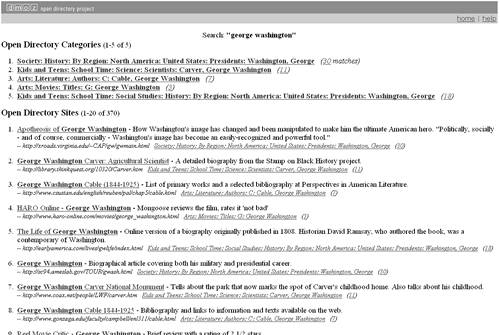Searchable Subject Indexes
Searchable subject indexes make no attempt to index the content of a site. Instead, the name and URL of a site—and usually some kind of brief description—are included in a set of categories. The categories are usually browsable, but they're searchable as well. Yahoo and the Open Directory Project are examples of searchable subject indexes.
Mixing It Up
Now, here's the tricky part. Google, a full-text search engine, has a searchable subject component called Google Directory. Yahoo, a searchable subject index, has the option to search a full-text engine. (Yahoo's directory results are from their searchable subject index, while their full-text search matches are called Web results and come from their own full-text search engine.) But primarily, Google is known as a full-text engine and Yahoo is known as a searchable subject index.
Why Have Two Kinds?
Why have two kinds of search engines anyway? What is each one good for?
Full-text search engines are good when you're searching for very distinct types of information—for example, quotes, song lyrics, addresses, less-famous people, lesser-known places, or complicated queries. Searchable subject indexes do not contain enough information about Web pages to answer these kinds of queries.
01-01. It's much easier to get meaningful results for a famous figure like George Washington using a subject index. (Image from http://search.dmoz.org/cgi-bin/search?search=%22george+washington%22.)

On the other hand, the limitations of searchable subject indexes make them very useful for more general searching—when you're trying to find information on New York, for example. Or George Washington. Or other general topics. Sometimes going through a searchable subject index finds you enough material that you can then get more specific information from a full-text engine. The two types of search engines work harmoniously together—provided you know which one to use first.
What They All Have in Common: Search Defaults
Despite the fact that they're searching very different things, both types of search engines have one thing in common: their search default. This is important, so pay attention.
When you enter a multiple-word query into a search engine and don't enter any search modifiers (like AND or NOT), the search engine has to decide how to treat your query. Broadly speaking, the search engine can do one of two things. It can decide to search so that all of your search words must be included in any results—in this case it's defaulting to AND. Or it can decide to search so that any of your search words must appear in a document for it to appear in search results. In that case it's defaulting to OR.
The first most important thing to know about a search engine is whether it's a full-text engine or a searchable subject index. The second most important thing to know is whether the search engine defaults to AND or OR. If it defaults to AND, you should be more thoughtful about your query words, because all query words you choose must appear in a Web page before you'll get results. If it defaults to OR, you should be sure to put + signs in front of terms that must be included in your search. You can also try to search more for phrases.
How can you tell if something defaults to AND or OR? Do a search with a very odd set of words—say elderberry chiropractic snowblower brick. If you get no results (or just a few results), you're searching an engine that defaults to AND. If you get lots of results, you've found an engine that defaults to OR.
Going Beyond Default with Boolean Modifiers
How do you tell a search engine when you want to include something or exclude something from your search? You use Boolean modifiers. These modifiers tell the search engine exactly how you want your search words to be treated. The two main Boolean modifiers are + (must include a word in a search), and - (word must not be in search result pages). There are other ones that we'll look at as we look at each search engine. But for now, a pop quiz: What does this search mean?
+"three blind mice" -"see how they run"
This is a simple one: the search results for this search must include the words “three blind mice” but must not include the phrase “see how they run.” (Most search engines specify phrases with quote marks.)
Beyond Basic Boolean: Getting Special
Boolean modifiers are simple, aren't they? + means must and - means must not. But things get a little more complicated than that. Some search engines have OR modifiers. (Google uses a pipe symbol (|) to specify OR. Look for the symbol on your keyboard; Shift- is a pipe. You may also hear it called a vertical bar.) Some search engines have NEAR modifiers.
And most search engines go beyond Boolean to special syntaxes. Special syntaxes allow you to do special searching within a Web page or related to a Web page—you can limit your searches to a Web page's title, or body, and so on. Different search engines have different types of special syntaxes, so we won't go into them in too much detail here.
